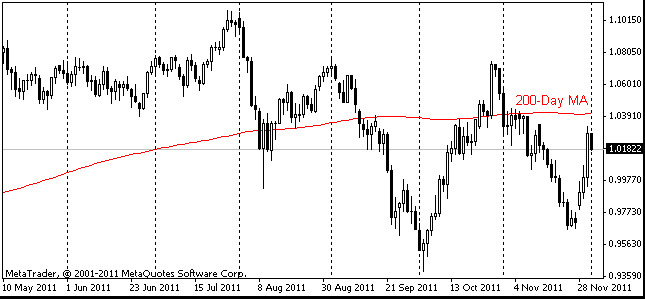EUR/usd
On Monday the markets managed to extend correction. The most reassuring thing is that the correction was performed simultaneously in different markets. In the previous review we mentioned that the growth of the euro against the background of the falling stock markets is nothing but a mere technical bounce. However, yesterday the demand for risky assets was supported in the stock markets as well. The American exchanges posted the largest growth in two months, speculating on the expectations that China is heading for a new wave of incentives. It looks as though the politicians of the Celestial Empire were afraid themselves that they stepped too hard on the brake and that the economy is now running the risk of hard landing. To confirm it, let's turn to the Conference Board's Coincident Index published overnight. It is the second time the index is on the decline over the last 4 months. And if in January the decrease could be regarded as a consequence of the public holidays in the country, April's decline of 0.8% makes us ponder over the hardships the economy might suffer under the current financial conditions. The balancing Chinese officials are to carry out won't be easy, as at the same time they will have to restrain property speculations. The Chinese affairs have a significant impact on the attitude to risk and, as has been repeatedly noticed, the stronger growth in Asia supports the euro. Of course, traders need to glance back at the state of affairs in the region itself. However, for now there is nothing of interest there, except for the French support of the idea of common bonds. This news is potentially favourable, but we all know how easily this potential disperses behind closed doors of numerous EU summits. EUR/USD has settled around 1.28, being too weak to go lower because of a record number of speculative short positions in the pair. Under such circumstances the market has no chance to go down, so the support at 1.2620 can remain intact over another couple of weeks.

GBP/USD
This day doesn't promise to be easy for Britain. As we mentioned yesterday, today the markets will pay their attention to the publication of borrowing volumes in the public sector. Thus, the markets will be able to check how well the British exchequer is filled and how close Cameron is to keeping his pledges. After all, only the confidence of investors that Britain will keep its word concerning the austerity gives the sterling a chance to attract investors, disappointed in most European governments. Yet we shouldn't overlook such an indicator as inflation. It is supposed that the annual rate will go down to 3.1%, albeit monthly the indicator is likely to post a 0.6% growth. In our opinion, the inflation rate may even come in below the referred levels. If true, the BoE will have more space for maneuvering and its head will probably won't have to write another letter with excuses to the Chancellor of the Excheque. Still it will hardly be good news for the sterling.

USD/JPY
USD/JPY is gradually correcting upwards and managed to climb above 79.40 earlier today, exceeding the level of the initial bounce which followed the drop from 80.30 to 79.10. However, the yen is sold with caution and looks less bright against the bounce in the stock exchanges. Still most experts say that with the levels below 80.0 the Ministry of Finance and the bank of japan tend to extend their landing programmes by means of a huge volume of the stored banking reserves. Yesterday we wrote that the lower boundary of the channel would pass through 77.40 at the end of the week. The upper one is now at 79.60, so it's quite possible that the markets will try to pull the pair up to this level.

AUD/USD
Though the potential incentives of China promise to have the most favourable effect exactly on the aussie, the markets are still quite cautious about this currency. The pair has slightly recovered from the drop below 0.98 at the end of the last week and at the very beginning of this week, but is still trading rather far from the parity, around 0.9920. The market participants are biding their time and trying to balance between the probable acceleration of growth in China and the negative caused by expectations of the further rate cut at the very beginning of June. To escape heavy sales, the Aussie had better remain in the shadow.
